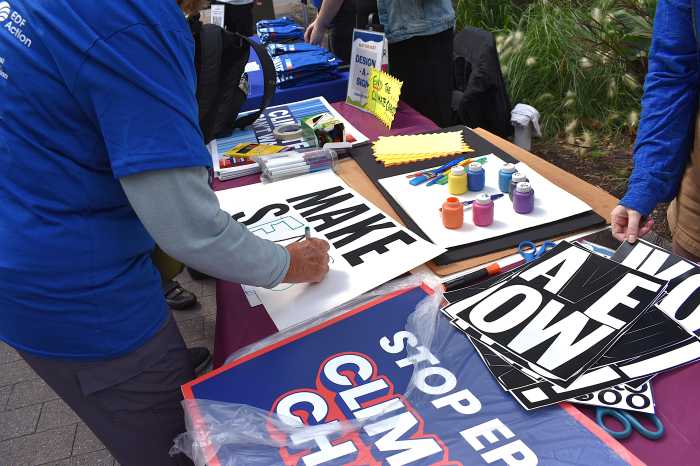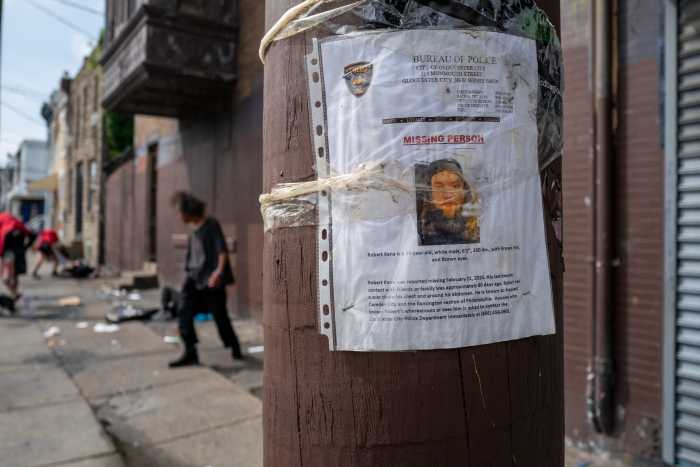Tuesday’s primary elections served as a “soft roll-out” of Pennsylvania’s recently passed voter identification law. Though it was not required to cast a ballot, polling place officials were instructed to request photo ID and give those without it a Pennsylvania Department of State handout explaining the documentation would be mandatory in this fall’s general election.
“This is just a dry run,” Stephanie Singer of the City Commissioner’s office said Monday. “We’re trying to educate everybody about the law that will be in place in November.”
When it came to actually implementing the mandate at the polls, success was mixed. “It’s about half and half,” Ellen Kaplan of political watchdog Committee of Seventy said Tuesday about three hours before voting ended. “There were some people that told us, ‘I was asked for an ID, I showed an ID and they gave me the handout. Other people are saying, ‘I wasn’t asked for an ID and I didn’t get the handout.’”
“Some of the judges of elections are asking people to show their photo ID, some are not because they don’t know they have to or because they know the person coming in. I think that there’s a fair amount of confusion on the part of polling place officials about what they’re supposed to be doing.”
Singer said Monday that, because of the state law’s recent passage, the City Commissioner’s office was not able to keep a systematic tally of voters that lacked photo ID during Tuesday’s elections. “This bill was passed March 12. We were already halfway through our coworker training and decided, rather than create a special training forum, we would educate our workers as planned,” Singer said.
And Kaplan added that, even if gathered, the numbers might not be particularly illustrative, anyway. “It’s hard to know because if the question is how many people in Philadelphia don’t have IDs, that’s a different question than how many people came today without an ID,” she said. “It’s hard to extrapolate from that and say, ‘This is an indication of who doesn’t have a photo ID.'”
To ID or not to ID
But at Southwest Center City senior living facility the Scottish Rite House, poll workers – who did not necessarily agree with the law – kept careful count of those with and without identification and recorded contact information of ID-lacking constituents to provide follow-up assistance. “I’ve talked with many neighbors about how this is an effort to suppress the vote, especially among different communities,” said Democratic committeeperson Gail Harrington. “I think if you can’t win one way, that’s the other way you can do it, and I think that was the intention of the state legislature – to suppress the vote.”
Still, she distributed fliers with information on how to get appropriate identification and kept a list of voters organized by address to help figure out where IDs are needed.
In contrast, committeepeople working at least one Center City location did the opposite, expressly instructing voters to refuse to present ID. “I think that, in this particular case, they think the law is going to be overturned,” Kaplan said.
“That could be interpreted by a voter as, ‘Well, we should just wait and see what’s going to happen.’ We don’t know what a court is going to say and we won’t know what a court is going to say tomorrow,” she said. “Whether or not you like the law or think the law is going to be overturned, the prudent thing to do is make sure you have the right kind of ID so you can vote in November and if you don’t have the right ID, you make sure to get one.”
Reservations remain
With the confusion that ruled many polling places causing unnecessary hassle, many expressed concerns that, when implemented, the ID law will only bring more of the same –and discourage would-be voters in the process.
“I think it will affect the election in November, especially among the elderly and among young people,” Harrington said. “It’s pretty interesting that the law is going to be enforced come November. I don’t think it’s an accident.”
Harrington also worried about how the law would impact some of Barack Obama’s biggest supporters: college students – a recent PennPIRG study found that 91 of 110 accredited Pennsylvania colleges and universities do not issue identification with a valid expiration date – and the elderly, especially minorities.
“This is senior housing – it’s going to be a big effort to get some of the residents government identification,” she said at the Scottish Rite House. “Many were born in the South a long time ago and don’t have the proper documents.”
“There have been studies that have been done on which voter constituencies are more likely than others to be negatively impacted by voter ID laws,” Kaplan said. “And the studies have shown that groups most likely to be affected are senior citizens, students, low income voters and members of ethnic constituencies.”
Democrat primary candidate for attorney general Patrick Murphy – who was lagging in the polls at press time – hinted that, if elected, he might take steps to encourage the repeal of the controversial law.
“I think it was passed by those in power in a desperate attempt to keep power. Its sole intent is to disenfranchise voters,” he said. “No doubt, our seniors, college students and minority communities are going to be disenfranchised. I fought overseas in the Army and was proud to give Iraqis the right to vote, yet we’re making it harder to vote here in our own community.”
Now and later
In order to vote yesterday, all you needed to do was show up, unless it was your first time at the polling place, in which case one document proving identity is required from the following list:
>> Driver’s license or PennDOT ID card
>> Passport
>> Employee or student identification
>> Photo or non-photo ID issued by the U.S. armed forces, city, state or federal government
>> County voter registration confirmation
>> Current utility bill, bank statement, paycheck or government check
>> Firearms permit
To vote in November, the list of acceptable identification – one of which will then be mandatory for all voters – becomes “very short and complicated,” Singer noted Monday. It is also a work in progress. “The State Department has been issuing more and more information about what’s going to be required with the voter ID law as we’ve been shooting over questions,” Kaplan said. “They’re really trying to put some meat on the bones.”
>> Driver’s license or PennDOT ID card
>> Passport
>> Photo ID issued by an accredited Pennsylvania college or university
>> Photo ID issued by the U.S. armed forces, city, state or federal government
>> Photo ID from a Pennsylvania assisted living or care facility
** All IDs must be currently valid and include an explicit expiration date and a photo **
Anyone who forgets their ID must vote via provisional ballot and present an acceptable form of identification in person to the county Board of Elections within six days of the election.





























